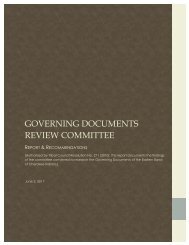SEVERE WINTER STORM PELTS AREA - Eastern Band of Cherokee
SEVERE WINTER STORM PELTS AREA - Eastern Band of Cherokee
SEVERE WINTER STORM PELTS AREA - Eastern Band of Cherokee
- No tags were found...
You also want an ePaper? Increase the reach of your titles
YUMPU automatically turns print PDFs into web optimized ePapers that Google loves.
Be Safe During aWinter StormNEWS ka-no-he-daNote: With another winter storm predicted for this weekend, the One Feather staffbrings you these safety ps from the Centers for Disease Control.Heat Your Home SafelyIf you plan to use a wood stove, fireplace, or space heater, be extremely careful.ollow the manufacturer’s instructions and remember these safety tips:Use fireplace, wood stoves, or other combustion heaters only if they are properlyented to the outside and do not leak flue gas into the indoor air space.Do not burn paper in a fireplace.Ensure adequate ventilation if you must use a kerosene heater.Use only the type <strong>of</strong> fuel your heater is designed to use—don’t substitute.Do not place a space heater within 3 feet <strong>of</strong> anything that may catch on fire, such asrapes, furniture, or bedding, and never cover your space heater.Never place a space heater on top <strong>of</strong> furniture or near water.Never leave children unattended near a space heater.Make sure that the cord <strong>of</strong> an electric space heater is not a tripping hazard but do notun the cord under carpets or rugs.Avoid using extension cords to plug in your space heater.If your space heater has a damaged electrical cord or produces sparks, do not use it.Store a multipurpose, dry-chemical fire extinguisher near the area to be heated.Protect yourself from carbon monoxide (CO) poisoning by installing a battery-operatedO detector and never using generators, grills, camp stoves, or similar devices indoors.ook SafelyNever use a charcoal or gas grill indoors—the fumes are deadly.Never use an electric generator indoors, inside the garage, or near the air intake <strong>of</strong>our house because <strong>of</strong> the risk <strong>of</strong> carbon monoxide poisoning.Plug in appliances to the generator using individual heavy-duty, outdoor-rated cords.Do not use the generator or appliances if they are wet because <strong>of</strong> the risk <strong>of</strong> electrocuion.Do not store gasoline indoors where the fumes could ignite.Light Your Home SafelyIf there is a power failure:Use battery-powered flashlights or lanterns rather than candles, if possible.Never leave lit candles unattended.Conserve HeatYou may need fresh air coming in for your heater or for emergency cookingrrangements. However, if you don’t need extra ventilation, keep as much heat as posibleinside your home. Avoid unnecessary opening <strong>of</strong> doors or windows. Close <strong>of</strong>f uneededrooms, stuff towels or rags in cracks under doors, and close draperies or coverindows with blankets at night.Keep a Water SupplyExtreme cold can cause water pipes in your home to freeze and sometimes rupure.When very cold temperatures are expected:Leave all water taps slightly open so they drip continuously.Keep the indoor temperature warm.Improve the circulation <strong>of</strong> heated air near pipes. For example, open kitchen cabinetoors beneath the kitchen sink.If your pipes do freeze, do not thaw them with a torch. Instead, thaw themlowly by directing the warm air from an electric hair dryer onto the pipes.f you cannot thaw your pipes, or the pipes are ruptured, use bottled water or get waterrom a neighbor’s home. As an emergency measure—if no other water is available—now can be melted for water. Bringing water to a rolling boil for one minute will killost microorganisms or parasites that may be present, but won’t remove chemical polutantssometimes found in snow.Eat and Drink WiselyEating well-balanced meals will help you stay warmer. Do not drink alcoholicr caffeinated beverages—they cause your body to lose heat more rapidly. Instead, drinkarm, sweet beverages or broth to help maintain your body temperature. If you have anyietary restrictions, ask your doctor.THURSDAY, FEBRUARY 4, 2010cherokee one feather7

















